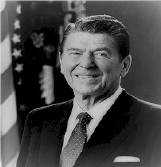 |
Ronald Reagan |
1980, Iran/USA: The Reagan/Bush "October Surprise"
By Carla Binion
A key factor in Reagan's winning the 1980 election was Carter's inability to negotiate a deal for the release of 52 U.S. hostages held after the revolution in Iran. Just as the Republican Watergate burglars tampered with an election and used illegal means to trump up dirt on Democratic presidential candidate George McGovern, Republicans again tampered with an election by secretly (and illegally) influencing the Iranians during the hostage crisis.
Gary Sick details the 1980 "coup" October Surprise. Sick was the principal White House aide for Iran during the hostage crisis. His book is based on his years on Carter's and Reagan's National Security Council staffs, three years of research and hundreds of interviews.
Republicans began secret dealings with Iran early in 1980 when Reagan's future CIA director, William Casey, initiated stealth contact with Iranian intermediaries. The Reagan-Bush campaign feared that President Carter would make a deal to have the hostages released just before the election. According to Sick's sources, Bill Casey met with high-level Iranians before the election and worked out an agreement to delay the hostage's release until after the election.
The Republican deal involved funnelling weapons to Iran, and tires for their U.S.-built fighter planes. The Iranians released the hostages "minutes after Reagan took the oath of office." Sick adds that almost immediately after Reagan took office, the flow of arms to Iran greatly increased.
Gary Sick writes, "to the extent that these people may have attempted to thwart the legitimate policies of the U.S. government or to manipulate the electoral process, they were engaged in nothing less than a political coup." Republicans did it before - during Watergate - and they have done it since, with the Clinton impeachment. Some of the players remain the same from one attempted coup to another. For example, Clinton's nemesis Lucianne Goldberg spied on McGovern for the Nixon campaign. Goldberg then resurfaced to try to bring Clinton down during the impeachment-via-sex scandal coup attempt.
What Republicans lack in honor they make up for in audacity. Of all the candidates they might foist on the public as front runner, a truly "in-your-face" choice is the son of a president who was entangled in such anti-democratic covert actions as Iran-Contra.
Sick notes that "a covert political coup like the one engineered by Casey in 1980, challenges the legitimacy of the political order. It deliberately exploits weaknesses in the political immune system and risks infecting the entire organism of state and society."
Source: Online Journal, Dec. 20, 1999.
www.onlinejournal.com/Media/DirtyTricks/dirtytricks.html
U.S. Navy pilot Captain Gunther Russbacher, who worked with Naval Intelligence and the CIA, says that on Oct. 19, 1980 (three weeks before the election) he flew U.S. officials to Paris to arrange the "October Surprise." On board, says Russbacher, were George Bush, William Casey, Robert Gates (Bush's future CIA Director) and Donald Gregg (whose CIA work began when Bush was director). They met with Hashemi Rafsanjani, the Ayatollah's second in command and Adnan Khashoggi, a powerful Saudi Arabian arms dealer. Arrangements were apparently made to give Iran $40 million as a down-payment to delay release of the hostages.
When future Paris meetings, secret payments and arms deals became known, the Iran-Contra scandal began to unravel. Russbacher, and several CIA operatives, who blew the whistle were subsequently jailed in the U.S.
Source: From articles by Harry V. Martin, The NAPA Sentinel, 1991, 1995
www.sonic.net/sentinel/usa3. html
Sportscaster (1930s)
B movie actor (1940-1966)
While President of the Screen Actors Guild (1947-1952), he was a friendly witness to the House Un-American Activities Committee and was an FBI informant who helped to blacklisted leftist actors in Hollywood.
Host, NBC's General Electric Theater (1950s-1962)
Governor of California (1966-1974)
President (1981-1989)
WWII pilot (1942-44)
Graduated from Yale, where he was a member of "Skull and Bones," an elitist secret society (1948)
started oil firms (1950s)
elected to House of Representatives (1966)
U.S. Ambassador to the UN (1971-1972)
Chair, Republican National Committee during the Watergate scandal (1973)
CIA Director (1976-1977)
Vice President (1981-1989)
President (1989-1993)
Office of Strategic Services (1941-1946)
created Capital Cities, a Wall Street investment firm and made millions with other top CIA spies (1954)
Chairman, Securities & Exchange Commission (1969-1977)
CIA director & top stockholder, ABC TV (1981-87)
Capital Cities bought ABC TV (1985)
Died just before testifying to Congress on the Iran-Contra scandal (1987)
Sources: